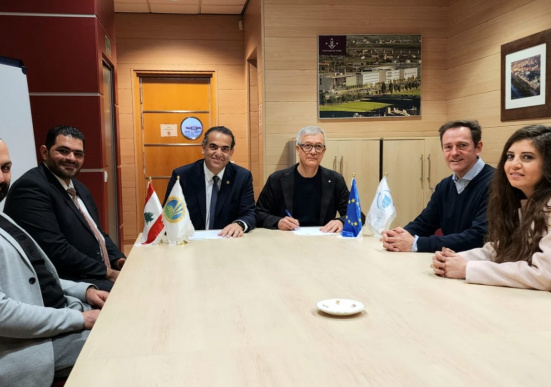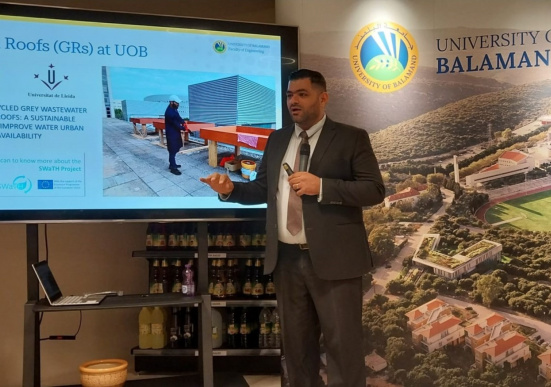Innovative Wastewater Treatment Technics: Training at the University of Granada (Spain) within the SWaTH Project

The “Advancing Innovative Wastewater Treatment Techniques” training that took place at the University of Granada in Spain in December 2021 as part of the SWaTH Project brought together participants from various institutions, including Makram El Bachawati and Henri El Zakhem from the University of Balamand, Rafik Belarbi from the University of La Rochelle, Velma Kimbi Yaah from the University of Oulu, Carl Aoun from the Lebanese American University, Walid Harb and Darine Geara from the Holy Spirit University of Kaslik, and Claudette Hajj from Notre Dame University-Louaize.
The training focused on the latest and most innovative techniques in wastewater treatment. Participants attended technical presentations by renowned experts, including:
- Francisco Maldonado Hódar, who presented on carbons for environmental solutions. He remarked, “Innovative carbon materials are pivotal in addressing environmental challenges, offering sustainable solutions for wastewater treatment.”
- Luisa Pastrana Martínez, who explained advanced oxidation processes for water treatment. She noted, “Advanced oxidation processes are crucial for breaking down complex pollutants, ensuring cleaner and safer water.”
- Sergio Morales Torres, who discussed the synthesis and properties of carbon-based membranes for water purification. He stated, “Carbon-based membranes represent a significant advancement in water purification technology, combining efficiency with sustainability.”
Additionally, the SWaTH team benefited from the sabbatical year of Teresa Bandosz from the City College of New York at the University of Granada, who shared new perspectives and challenges for nonporous carbons. Bandosz highlighted, “Exploring nonporous carbons opens new avenues for innovative wastewater treatment solutions, addressing both current and future environmental needs.”
The mobility program also included several site visits to enhance practical understanding:
- Hospital Universitario Clínico San Cecilio: Participants observed the hazardous liquid waste treatment and solid waste collection processes, gaining valuable insights into hospital waste management practices.
- Emasagra Wastewater Treatment Plant: This visit allowed the SWaTH team to see the various steps and stages of biological wastewater treatment, providing a comprehensive view of the treatment process from start to finish.
- UGR’s Center for Scientific Instrumentation (CIC): At the CIC, participants were introduced to state-of-the-art scientific instruments and technologies used in wastewater analysis and research. This visit provided a deeper understanding of the analytical techniques and tools essential for monitoring and improving wastewater treatment processes.
Overall, the mobility to Granada was a significant opportunity for participants to enhance their expertise, exchange knowledge with peers, and explore practical applications of advanced wastewater treatment technologies. The combination of theoretical training and practical site visits provided a well-rounded learning experience, equipping participants with the skills and insights needed to address current and future challenges in wastewater management. For instance, Henri El Zakhem said, “The training in Granada was an eye-opener. The advanced techniques we learned will significantly enhance our wastewater treatment projects back home,” Carl Aoun shared, “The exposure to cutting-edge technologies and methodologies will greatly benefit our ongoing and future projects,” Walid Harb added, “The opportunity to interact with experts and peers from different countries provided a broader perspective on the challenges and solutions in wastewater management,” and Claudette Hajj commented, “The hands-on experience and the site visits were invaluable. Seeing the practical applications of what we learned in the classroom was incredibly beneficial.”


